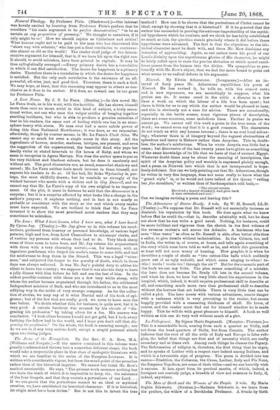Nineveh. By Edwin Atherstone. (Longmans.)—Af ter an in- terval of
forty years Mr. Atherstone republishes his poem of Nineveh. He has revised it, he tells us, with the utmost care; and it now represents, we are accordingly to. suppose, what his genius can do. It seems cruel in the critic o dismiss in a few lines a work on which the labour of a life has been spent ; but there is little for us to say which the author would be pleased to hear, and this is obviously not a case for advice. There are occasionally, especially in the battle scenes, some vigorous pieces of description, there are some sonorous, some melodious lines. Farther in praise we cannot go. We cannot call this work a poem in the true sense of the word ; we cannot even say that it is a good romance. The characters do not touch us with any human interest ; there is no real local colour- ing; whatever there is of imagery beyond the vaguest abstractions of splendour and terror is Hebrew rather than Assyrian. This is, doubt- less, the author's misfortune. When he wrote Assyria was little but a name ; but discoveries of the last twenty years have given us something of the same knowledge of its life that we have of that of ancient lEgypt. Whatever doubt there may be about the meaning of inscriptions, the spirit of the Assyrian policy and worship is expressed plainly enough, and a poem on Nineveh into which that is not incorporated is hope- lessly deficient. Nor can we help pointing out that Mr. Atherstone, though he writes in very fine language, does not seem really to know what the "grand style" is, or he would not have talked of the Queen "veiling her fine shoulders," or written thus of Sardanapalas's cold bath,— " The crystal stream
Received a heated drunkard, and gave back A man refreshed and cool."
Can we imagine revising a poem and leaving this ?


































 Previous page
Previous page